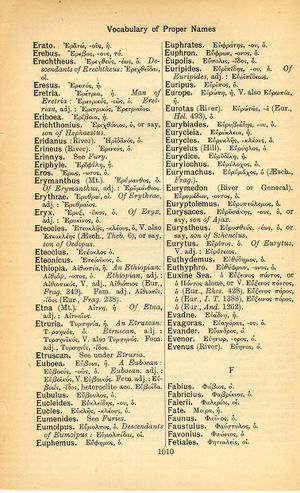Eretria: Difference between revisions
καλῶς γέ μου τὸν υἱὸν ὦ Στιλβωνίδη εὑρὼν ἀπιόντ' ἀπὸ γυμνασίου λελουμένον οὐκ ἔκυσας, οὐ προσεῖπας, οὐ προσηγάγου, οὐκ ὠρχιπέδισας, ὢν ἐμοὶ πατρικὸς φίλος → Ah! Is this well done, Stilbonides? You met my son coming from the bath after the gymnasium and you neither spoke to him, nor kissed him, nor took him with you, nor ever once felt his balls. Would anyone call you an old friend of mine?
(Names) |
(6_6) |
||
| Line 5: | Line 5: | ||
<b class="b2">Eretrian</b>, adj.: Ἐρετρικός, Ἐρετριαῖος. | <b class="b2">Eretrian</b>, adj.: Ἐρετρικός, Ἐρετριαῖος. | ||
}} | |||
{{Lewis | |||
|lshtext=<b>Ĕrĕtrĭa</b>: ae, f., = Ἐρετρία.<br /><b>I</b> The [[principal]] [[city]] on the [[island]] of [[Euboea]], the birthplace of the [[philosopher]] [[Menedemus]], [[now]] Palaeo Castro, Plaut. Merc. 3, 4, 59; Mel. 2, 7, 9; Plin. 4, 12, 21, § 64; Cic. Ac. 2, 42; Liv. 32, 16; 35, 38 al.—<br /> <b>B</b> Derivv.,<br /> <b>1</b> Ĕrĕtrĭus, a, um, adj., Eretrian: [[creta]], Plin. 33, 13, 57, § 163; so, [[terra]], Cels. 5, 15; 6, 3.—Subst.: [[Eretria]], ae, f., Plin. 35, 6, 21, § 38; Vitr. 7, 14.—<br /> <b>2</b> Ĕrĕtrĭ-[[ensis]], e, adj., of [[Eretria]]: Gongylus, Nep. Paus. 2.—Subst., Ĕrĕtrienses, ium, m., the inhabitants of [[Eretria]], Liv. 35, 38.—<br /> <b>3</b> Ĕrĕtrĭăci, ōrum, m., philosophers of the [[school]] of [[Menedemus]], Cic. Ac. 2, 42, 109. —Also called,<br /> <b>4</b> Ĕrĕtrĭci, ōrum., m., Cic. de Or. 3, 17; Sen. Ep. 88 fin.—In <[[number]] opt="n">[[sing]].</[[number]]>: Ĕrĕtrĭcus, an Eretrian [[philosopher]], Cic. Tusc. 5, 39.—<br /><b>II</b> A [[city]] of [[Thessaly]], in Phthiotis, [[now]] Tzangli, Liv. 32, 13; 33, 6. | |||
}} | }} | ||
Revision as of 08:30, 13 August 2017
English > Greek (Woodhouse)
Ἐρέτρια, ἡ.
Man of Eretria: Ἐρετριεύς, -ιῶς, ὁ.
Eretrian, adj.: Ἐρετρικός, Ἐρετριαῖος.
Latin > English (Lewis & Short)
Ĕrĕtrĭa: ae, f., = Ἐρετρία.
I The principal city on the island of Euboea, the birthplace of the philosopher Menedemus, now Palaeo Castro, Plaut. Merc. 3, 4, 59; Mel. 2, 7, 9; Plin. 4, 12, 21, § 64; Cic. Ac. 2, 42; Liv. 32, 16; 35, 38 al.—
B Derivv.,
1 Ĕrĕtrĭus, a, um, adj., Eretrian: creta, Plin. 33, 13, 57, § 163; so, terra, Cels. 5, 15; 6, 3.—Subst.: Eretria, ae, f., Plin. 35, 6, 21, § 38; Vitr. 7, 14.—
2 Ĕrĕtrĭ-ensis, e, adj., of Eretria: Gongylus, Nep. Paus. 2.—Subst., Ĕrĕtrienses, ium, m., the inhabitants of Eretria, Liv. 35, 38.—
3 Ĕrĕtrĭăci, ōrum, m., philosophers of the school of Menedemus, Cic. Ac. 2, 42, 109. —Also called,
4 Ĕrĕtrĭci, ōrum., m., Cic. de Or. 3, 17; Sen. Ep. 88 fin.—In <number opt="n">sing.</number>: Ĕrĕtrĭcus, an Eretrian philosopher, Cic. Tusc. 5, 39.—
II A city of Thessaly, in Phthiotis, now Tzangli, Liv. 32, 13; 33, 6.

